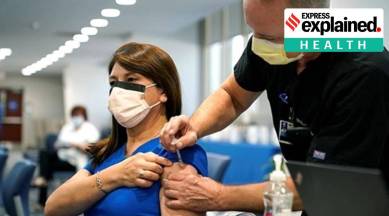Explained: Booster doses in the US, other countries and India’s position
Apart from the US, Canada is planning to recommend booster shots for those people who are severely or moderately immunocompromised. A similar recommendation was made by the EU's drug regulator last month.

On Friday, the US Centers for Disease Control and Prevention (CDC) Director Rochelle P. Walensky expanded recommendations for booster shot doses for Covid-19 to all adults who are 18 years and older. This means that all adults who received either a dose of the Pfizer or Moderna anti-COVID vaccines are eligible to get a booster dose at least six months after their second dose.
As of now, about 47 million adults in the US are not vaccinated, according to the CDC. “Booster shots have demonstrated the ability to safely increase people’s protection against infection and severe outcomes and are an important public health tool to strengthen our defenses against the virus as we enter the winter holidays. Based on the compelling evidence, all adults over 18 should now have equitable access to a COVID-19 booster dose,” Walensky was quoted as saying in a release.
monthly limit of free stories.
with an Express account.
Which other countries are giving COVID-19 booster shots?
Apart from the US, Canada is planning to recommend booster shots for those people who are severely or moderately immunocompromised. A similar recommendation was made by the European Union’s (EU) drug regulator last month.
But while some countries in the EU, such as Austria, Germany and Italy among others are offering booster doses to all adults, some including Sweden and Spain have targeted booster doses at certain population groups such as the elderly and those that are immunocompromised.
Other countries administering booster doses include Israel, the UK, South Korea, Turkey and Brazil are also administering booster doses.
On November 18, about 12 per cent of the Covid-19 vaccinations administered globally were booster doses. As of now, Israel, Chile and Uruguay have administered the highest number of booster doses per 100 people.
Has the WHO changed its position on booster doses?
The WHO has repeatedly urged countries not to administer booster doses. In a note it published in October, it said that evidence for requiring booster doses “remains limited” and inconclusive.
“In the context of ongoing global vaccine supply constraints, broad-based administration of booster doses risks exacerbating inequities in vaccine access by driving up demand and diverting supply while priority populations in some countries, or in subnational settings, have not yet received a primary vaccination series,” WHO said.
According to the latest data from Our World in Data, most countries that have administered 0-20 doses per 100 people, are in Africa. Only 5 percent of the population living in low-income countries have received at least one dose of the vaccine. Overall, over half of the world’s population (52.6 percent) has received at least one dose of the COVID-19 vaccine.
Where does India stand on booster doses?
In India, there is no intimation as of now about booster doses. Some of the factors that India will need to consider before making a decision on booster shots include vaccine effectiveness, waning immunity and the supply of vaccines. India has administered a total of about 1.15 billion doses since its vaccination campaign began on January 16.